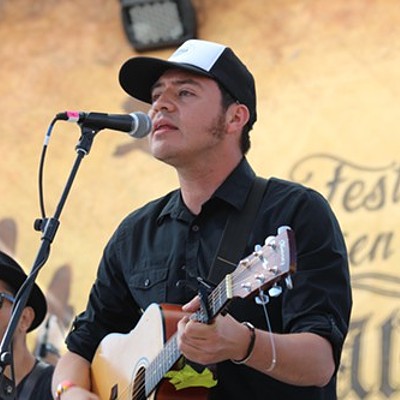Megafaun's first Tucson show was a quiet affair.
In August 2009, a delayed flight for the singer of tour mates Bowerbirds forced the band from the Club Congress mainstage into the banquet room, where the North Carolina trio performed completely unamplified, with spare instrumentation holding their glorious harmonies aloft for the small but attentive crowd.
This time around, the band will play in front of more than 2,000 people at the third Festival en el Barrio, joining Latin-rock combo Grupo Fantasma (recently inducted into the Austin Music Hall of Fame) and Tucson's Sergio Mendoza y la Orkesta and Calexico in the mainstage lineup.
For Megafaun's drummer/vocalist Joe Westerlund, it was those intimate shows that made it possible for the band to translate its swirling psychedelic folk-rock to the larger stages the band plays now.
"We got our start booking our own tours while still opening for some of our friends, and we'd end up in people's living rooms some nights. We took a lot out of those experiences in the way that we connect with people," Westerlund says.
Ultimately, getting bumped to a side room and singing without microphones was more than just "making chicken salad from chicken shit," as Westerlund puts it. It was a good fit for Megafaun, talented jazz-trained musicians who'd only recently begun playing as a trio and writing their own songs.
"At the beginning of the band, we were experiencing a lot of firsts—writing songs for the first time, recording ourselves for the first time, playing as a trio for the first time," he says. "It's a scenario that we're comfortable with, and we sort of look for. We've thrown around ideas with our booking agent about a church tour, completely unamplified."
Megafaun began after the breakup of DeYarmond Edison, formed in Eau Claire, Wis., and including Justin Vernon of Bon Iver and Chris Porterfield. Porterfield's first album as Field Report will be released later this year.
Westerlund and brothers Brad (bass, guitar) and Phil (keyboards, banjo) Cook share songwriting and singing duties, and over the course of three albums and an EP, they have shown they're adaptable to everything from spare folk to psychedelic freakouts, turning sometimes to horns and even classic 1960s pop. Comparisons to the Grateful Dead and contemporaries like Akron/Family might get close to describing the band's sound, but any singular comparison will fall short.
"We're just interested in so many different styles of music. ... It's just part of who we are. I don't think we can change that," Westerlund says. "Having that background of music education in general, and having the jazz influence has enabled us to go that many more places in our arrangements. But I think more than anything, it's a state of mind for us. We love improvisation. That's the greatest thing we've taken from listening to a lot of jazz and absorbing a lot of jazz."
A vibrant and obvious part of the band's live performances, improvisation also has been a big part of the band's collaborative songwriting.
"Improvisation becomes a player in the recording studio in more of a preparation kind of way. ... Sometimes, just letting yourself go for a half-hour can really bear some interesting things that you couldn't have just thought of," Westerlund says.
For the Heretofore EP, one 12-minute song actually got clipped from an extended improvised jam in the recording studio. For the band's self-titled 2011 album, however, the focus was on writing at least slightly more conventional songs in terms of structure.
"For that record, I had just moved to Los Angeles at the point we were recording, so it was our first long-distance experience with writing, so it became a little bit more individual. It forced us to really take it song by song, and we had a leader more so on each song," Westerlund says. "... Ever since then, we've just been paying so much more attention to brevity and lyrics and making sure that the song form is very accessible."
For every bit of boundary-pushing on Megafaun—like the squealing feedback of the eight-minute "Get Right," and the bluesy wail of "Scorned"—there's the balance of quiet or catchy tunes. "Second Friend" has the classic pop sensibility of a Harry Nilsson song, while "Kill the Horns" pairs a beautifully ascending acoustic guitar line with tinkling piano. "Resurrection" is classic alt-country that recalls Uncle Tupelo and the Jayhawks.
"We're guys who get ideas but don't have a whole lot of control over them," Westerlund says. "Every time we write something, it takes us to a place we haven't been before. But you end up where you end up."
After playing together for 16 years, the band can quickly bounce back and forth between songs already written and music ideas that strike in the moment. And, not surprisingly, they're the type of musicians who can finish each other's thoughts at just the right moment.
Megafaun's opener, "Real Slow," started as an up-tempo solo acoustic-guitar tune from Phil Cook. As soon as he played it, Brad told him to slow it down and think of the vibe of the Grateful Dead's "Wharf Rat."
"We use a lot of reference points when we're recording," Westerlund says. "... It happens differently for each song."
Megafaun is at the end of the touring cycle for the recent album, with just a string of shows stretching from Tucson to the Southeast left before European festivals. Westerlund promises two "really awesome collaborations" coming for the band in 2012, though he wouldn't reveal them, before they start writing and recording the next record.
"We're thankful every day we're able to be doing what we're doing, and doing it together. It's a really meaningful thing to be able to share with people across the country and across the Atlantic. It's something we're humbled by, and thankful for it every day," Westerlund says.








